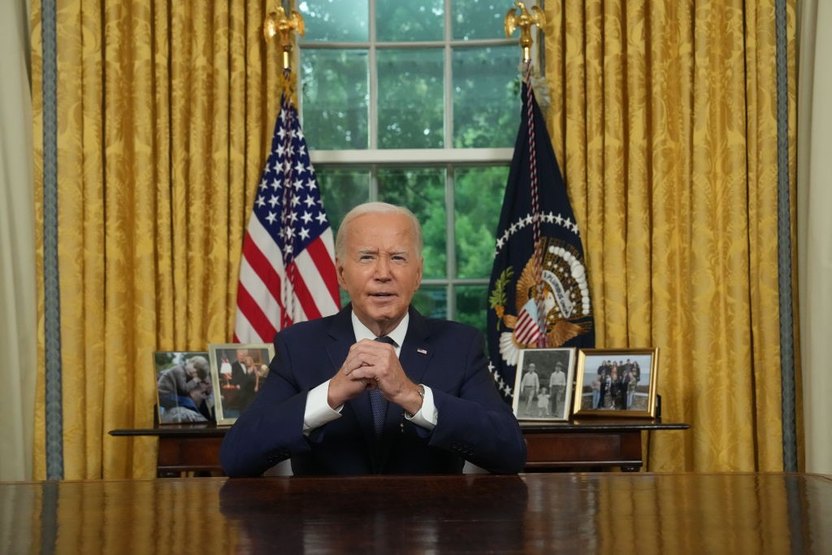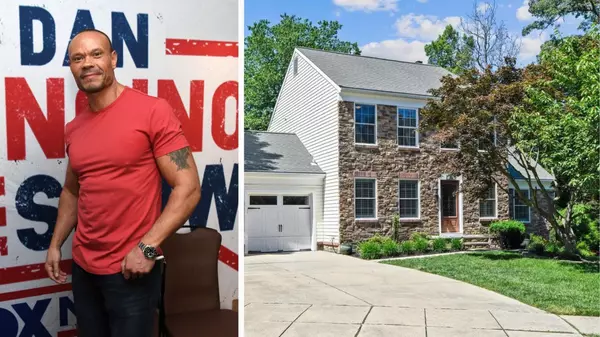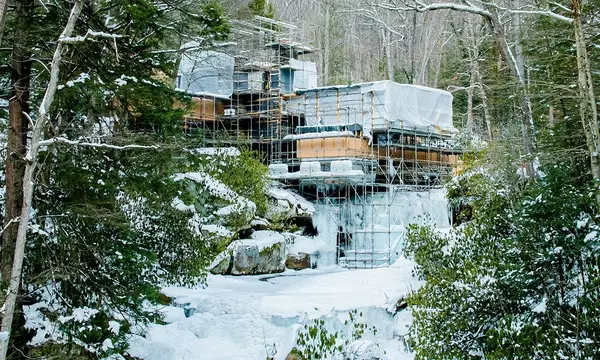President Biden Calls on Congress To Cap Rent Hikes at 5%

Photo-illustration by Realtor.com; Source: Erin Schaff-Pool/Getty Images
President Joe Biden has called on Congress to pass legislation that would cap annual rent increases in apartments owned by large landlords at 5% annually.
The White House released the plan on Tuesday as Biden traveled to Nevada, one of the swing states where soaring housing costs have emerged as a key issue in his reelection battle against Republican nominee Donald Trump.
Biden’s proposed rent cap would apply only to existing rentals managed by “corporate landlords” who own more than 50 units, covering about half of the U.S. rental market. Those landlords would have to either agree to cap rents at 5% annually, starting this year and for the next two years, or lose special tax incentives, according to a summary of the plan released by the White House.
“Rent is too high and buying a home is out of reach for too many working families and young Americans, after decades of failure to build enough homes,” Biden said in a statement. “Today, I’m sending a clear message to corporate landlords: If you raise rents more than 5% on existing units, you should lose valuable tax breaks.”
It comes after Biden prematurely hinted at the proposal at a press conference last week, where he sparked confusion in housing policy circles by mentioning plans to cap rent hikes at 5% without offering further details.

Erin Schaff-Pool/Getty Images
The new rent cap plan, which would require the approval of a currently divided Congress, drew swift backlash from industry groups that represent homebuilders and landlords, who argued that it would exacerbate the housing crisis by discouraging new construction of rentals.
The proposal is unlikely to pass Congress, where Republicans hold a narrow House majority, unless Biden wins reelection and his Democrats emerge with House and Senate majorities in the November elections. That’s a reality that the White House acknowledged in a statement.
“Republicans in Congress have blocked the President’s housing agenda,” the statement said. “While Republicans side with corporate landlords that are raising rents, President Biden is cracking down on price gouging and building more homes to lower rents and put homeownership in reach for working families.”
More immediately, Biden also announced plans on Tuesday to free up sections of federal land in Southern Nevada to build up to 15,000 new affordable housing units. It follows longstanding calls in the Silver State to convert some of the state’s vast federal lands, and echoes a similar proposal from Trump to use a portion of federal lands for new construction.
“What’s encouraging is that the recently announced policies of both the Biden administration and Trump campaign seem to be more similar than they are different, with both calling to open up more federally owned land for new housing supply and lowering housing costs through tax incentives,” says Realtor.com® senior economist Ralph McLaughlin.
“The primary difference is that Biden has specifically targeted the renter side of the market through caps on rent increases by landlords that utilize federal subsidies,” adds McLaughlin. “The renter side of the market is a side the Trump campaign has yet to address, and we’re eager to hear their views on the matter.”
In April, the Biden administration issued a new rule capping annual rent increases at 10% in units financed by the Low-Income Housing Tax Credit. This program incentivizes private investment in affordable housing developments. His new plan would go much further, pushing all large landlords to limit rent increases to 5% at least through 2026.
Biden’s rent cap plan draws polarized reactions
The federal government has never imposed broad nationwide restrictions on rent increases by landlords. Historically, rent control policies in the U.S. have been implemented at the state and local levels, not federally.
The new White House plan to cap rents at 5% would apply only to existing properties. It would exclude any new construction, a distinction the White House says is designed to promote the development of more sorely needed housing units.
Still, groups representing homebuilders and landlords slammed the proposal, insisting it would exacerbate a national housing shortage.
“Rent control in any form is bad for housing and President Biden’s tax plan to cap rents at 5% on existing multifamily structures will worsen the housing affordability crisis by discouraging developers from building new rental housing units at a time when the nation is experiencing a shortfall of 1.5 million housing units,” says Carl Harris, chairman of the National Association of Home Builders.
“These rent caps would also hurt existing tenants—those that the president is trying to help—because owners and developers would be unable to cover rising costs if rents are fixed,” adds Harris.

Getty Images
The NAHB instead called on Biden to expand the Low-Income Housing Tax Credit and to slash regulations that the homebuilders claim stall multifamily projects by adding excessive burdens and costs.
The National Apartment Association, which represents owners of multifamily properties, slammed Biden’s plan as “another attempt at failed rent control policy that will harm communities and renters across the U.S.”
“Federal rent control will only drive rental homes out of the market, decreasing housing options while increasing housing costs and placing upward pressure on inflation,” the group said in a statement. “It’s time to stop issuing policies that harm the people that are trying to house Americans.”
Even some groups focused on affordable housing were critical of Biden’s new plan.
“Rent caps don’t work and will have a chilling effect on housing supply. Exempting new construction will do nothing to change this, making clear that long term investments in housing can be made uneconomic retroactively,” said David M. Dworkin, president and CEO of the National Housing Conference, a coalition of affordable housing leaders. “It’s time to stop making policy by bumper sticker and get serious about housing production.”
Other affordable housing advocates offered cautious praise of the rent cap plan, but they argued that it does not go far enough or make full use of the tools at the administration’s disposal.
“President Biden’s proposal to temporarily cap rent hikes to prevent rent gouging is historic,” says Diane Yentel, president and CEO of the National Low Income Housing Coalition. “But rather than waiting for Congress to advance anti-rent gouging measures after the election, President Biden can and should take action now to put in place these and other critical protections for renters living in properties with federally backed mortgages, as called for by NLIHC and renters nationwide.”
The NLIHC instead is calling on Biden to implement new rules through the Federal Housing Finance Agency, which in theory could restrict rent increases in properties financed with mortgages backed by Fannie Mae or Freddie Mac, both government-sponsored enterprises.

Kyle Grillot/Bloomberg via Getty Images
An FHFA official told Realtor.com last week that the agency has not ruled out any new measures for tenant protections, including examining rent increases. But the person said that no decisions have been made on a timetable for future announcements and that potential changes would have to be carefully studied for any legal or other risks.
Tara Raghuveer, director of the nonprofit Tenant Union Federation, praised the concept of rent caps on social media, but called Biden’s plan a “talking point” that needed to be backed up by action.
Meanwhile, Biden is expected to tout his new housing initiatives at an economic summit in Las Vegas on Tuesday afternoon, attempting to elevate the issue in a fractious campaign season that has been rocked by his poor performance in last month’s debate as well as Saturday’s assassination attempt on Trump.
“We welcome ongoing housing-related discourse on the national stage during this election season,” says McLaughlin. “Though the policies that long have been a barrier to housing supply exist mostly at the state and local levels, the federal government does have both a symbolic and practical role to play in helping address supply issues.”
The Realtor.com economist adds that he hoped “the symbolic nature of these federal efforts helps spur further discussion of housing policy at all levels of governance.”
Categories
Recent Posts











676 N Michigan Ave. Ste 3010, Chicago, IL, 60611, United States